Key takeaways
- A well-crafted musician portfolio should include original music samples, collaborative projects, live performance clips, a personal bio, and testimonials to showcase individuality and talent.
- Collaboration enhances creativity and fosters a supportive community, leading to meaningful connections and networking opportunities in the music industry.
- Clear communication and respecting each other’s musical styles are essential for successful partnerships, as they help prevent misunderstandings and enhance the collaborative experience.
- Embracing vulnerability and flexibility in songwriting can deepen emotional connections with audiences and lead to unexpected creative breakthroughs.
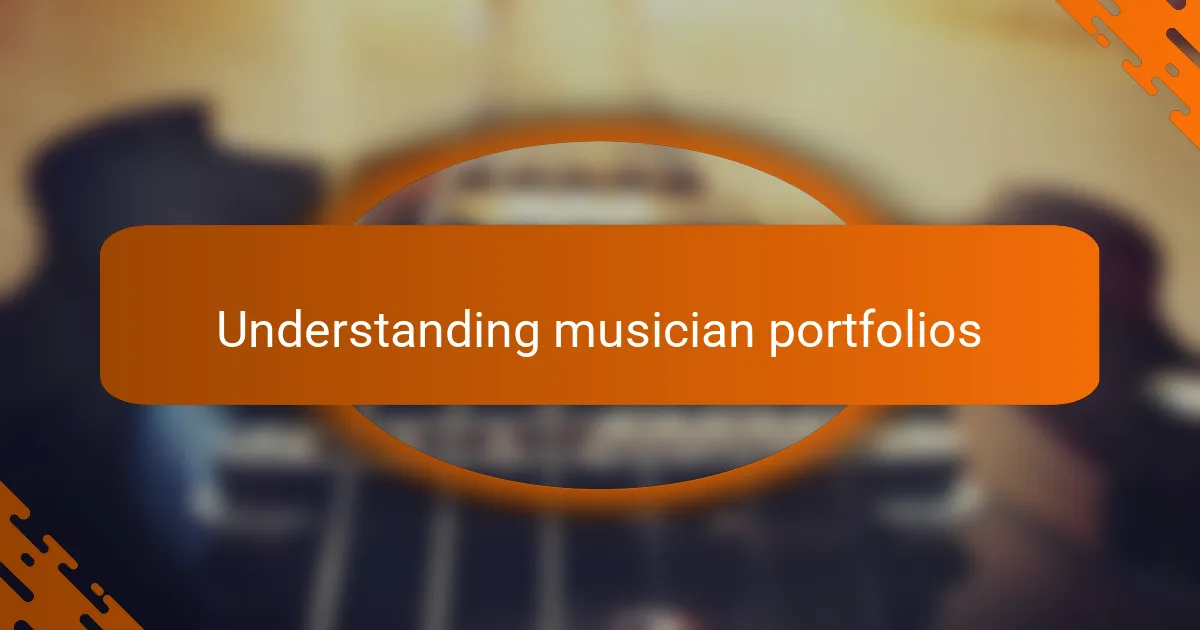
Understanding musician portfolios
Understanding musician portfolios is crucial for showcasing talent and attracting collaboration opportunities. In my journey through the vibrant Nashville music scene, I realized that a well-crafted portfolio can speak volumes about an artist’s abilities and potential. It’s not just about listing songs; it’s about telling your unique story.
When I first started building my portfolio, I focused on elements that not only highlighted my skills but also resonated with my personal experiences. Here are some key components I found essential:
- Original Music Samples: Include a few high-quality recordings that reflect your style.
- Collaborative Projects: Highlight any partnerships with other artists to showcase your ability to work within a team.
- Live Performance Clips: Share videos of your performances to demonstrate your stage presence and connection with the audience.
- Bio: Write a personal bio that shares your musical journey, influences, and goals.
- Reviews or Testimonials: Adding feedback from industry professionals or fans can lend credibility and create a personal touch.
Collaborating in Nashville taught me that every artist’s story is different, and your portfolio should reflect that individuality. What are some elements that speak to your journey?
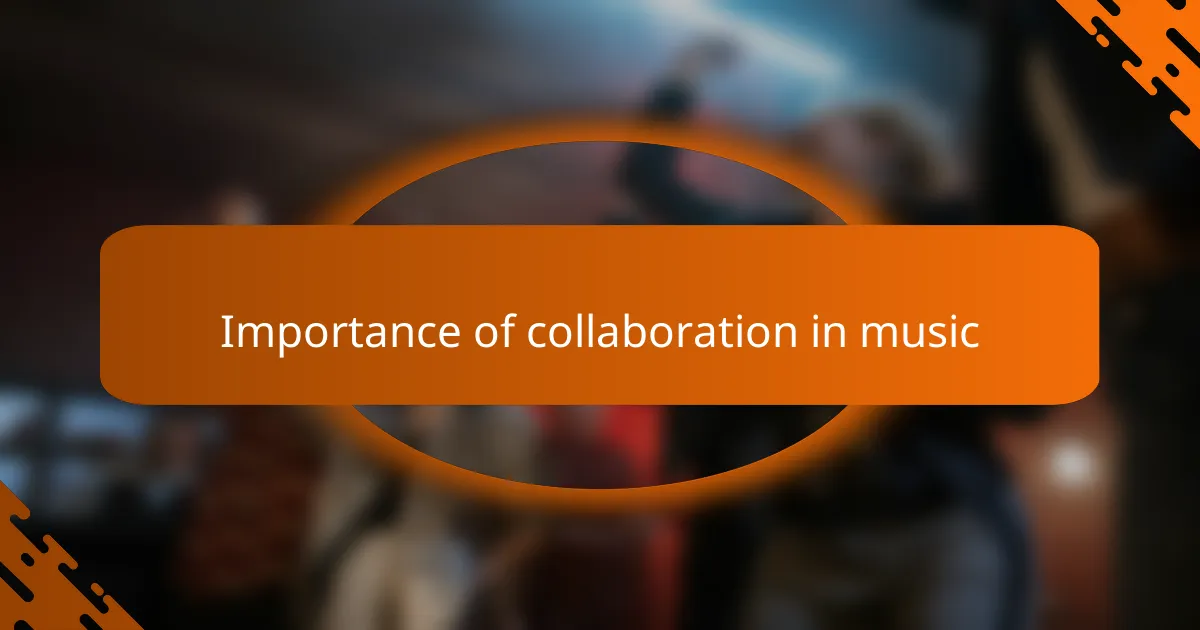
Importance of collaboration in music
Collaboration in music is essential because it brings together diverse perspectives and talents, amplifying creativity. When I worked with other musicians in Nashville, I quickly noticed how our different backgrounds and styles meshed to create something far greater than what any of us could achieve alone. It was like weaving a beautiful tapestry; each thread adding depth and color to the final piece.
In my experience, collaboration fosters a sense of community and support among artists. I remember a late-night jam session where an idea for a new song morphed into an unexpected anthem, thanks to the spontaneous contributions of my fellow musicians. It made me realize that these connections are not just about the music; they develop friendships and shared memories that enrich the artistic journey.
Moreover, collaborative projects offer valuable networking opportunities that can open doors within the industry. Every time I teamed up with someone new, I found myself on the radar of their connections, and it helped me grow both personally and professionally. Have you ever thought about how much more you can achieve when you combine your efforts with others? In Nashville, this idea is at the heart of everything we do.
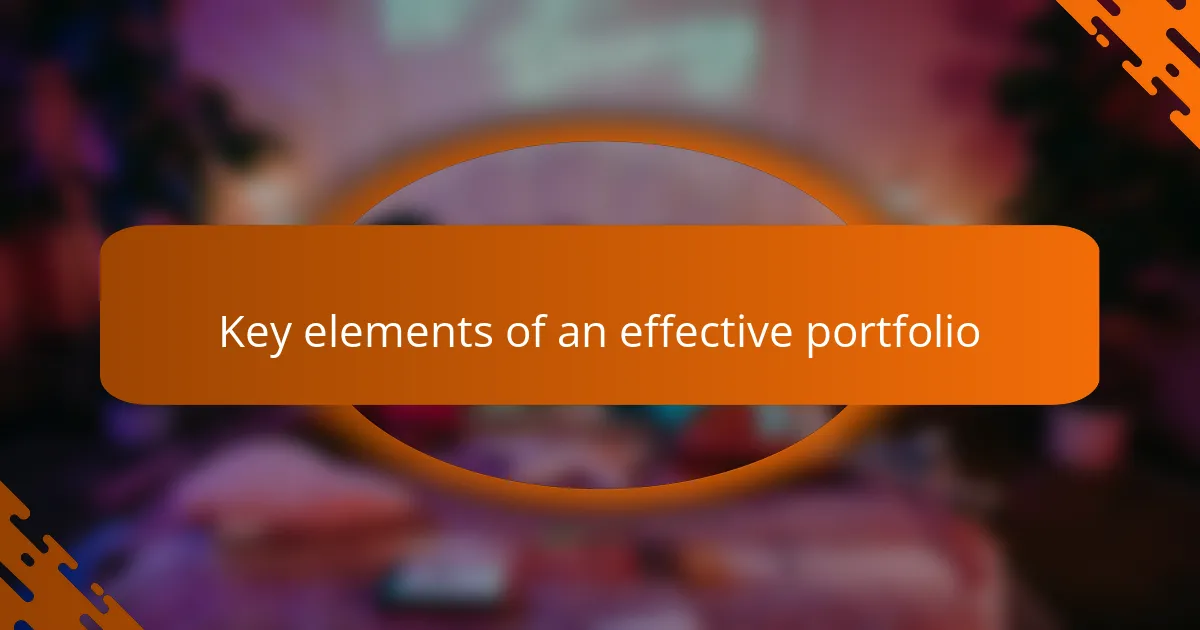
Key elements of an effective portfolio
An effective portfolio must feature high-quality original music samples that truly showcase your unique style. When I first began, I spent countless hours perfecting my recordings, ensuring they conveyed not just my technical skills but also the emotions I wanted listeners to feel. Have you ever listened to a song and felt like you could relate to the artist? That’s the connection I aimed for, and it’s what makes a portfolio really shine.
Including collaborative projects in your portfolio is another key element to highlight your teamwork abilities. I remember when I collaborated with local artists; we blended our influences and created a piece that surprised us all. It’s powerful to show potential collaborators and industry professionals that you can thrive in a team setting. Isn’t it inspiring to think about the magic that happens when artists come together?
Lastly, don’t underestimate the impact of personal storytelling in your bio. Sharing your musical journey adds a layer of authenticity that resonates with viewers. I’ve shared everything from my early inspirations to my current goals, and it’s amazed me how much feedback I’ve received. Isn’t it refreshing when an artist’s story connects with their audience on a deeper level? That’s exactly what a compelling portfolio should do.
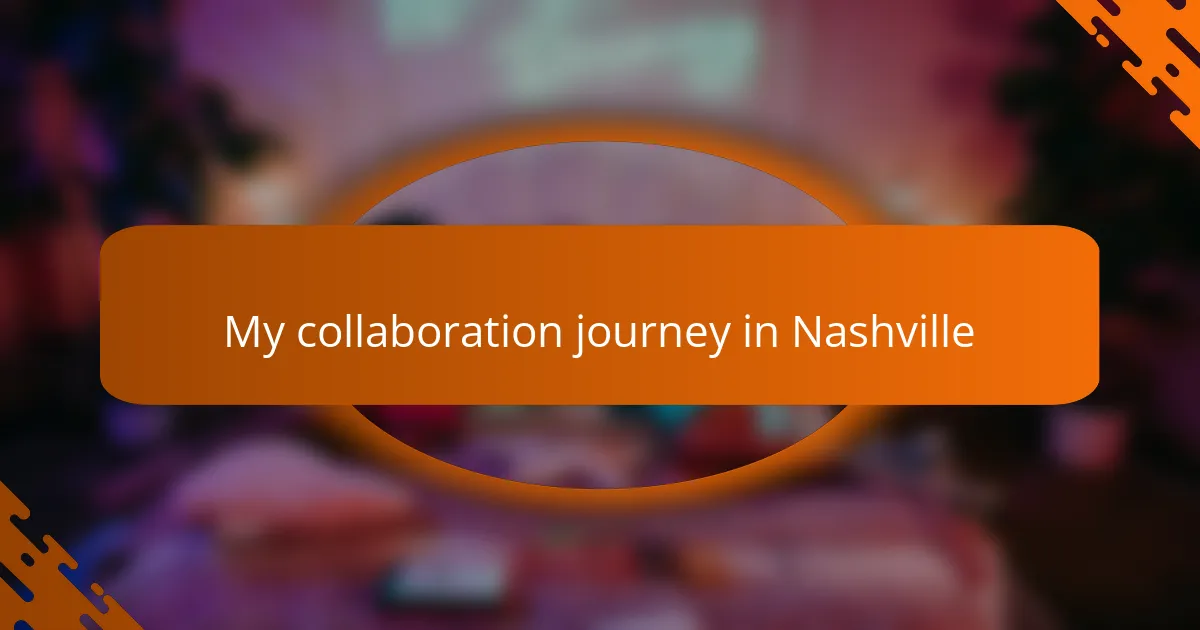
My collaboration journey in Nashville
My collaboration journey in Nashville has been nothing short of transformative. I remember stepping into a famous recording studio for the first time, surrounded by seasoned musicians who welcomed me with open arms. That sense of community fostered a creative energy that pushed me to explore my sound in ways I never thought possible.
Collaboration in Nashville is about more than just creating music; it’s about building relationships and sharing stories. Here are a few notable aspects of my experience:
- I’ve learned the importance of vulnerability in songwriting, sharing personal experiences to resonate with listeners.
- Networking in local venues led to unexpected collaborations that enriched my artistic perspective.
- Jamming with other musicians often resulted in spontaneous sessions that ignited new ideas and compositions.
- The thrill of performing with others brought a sense of belonging that fueled my passion for music even further.
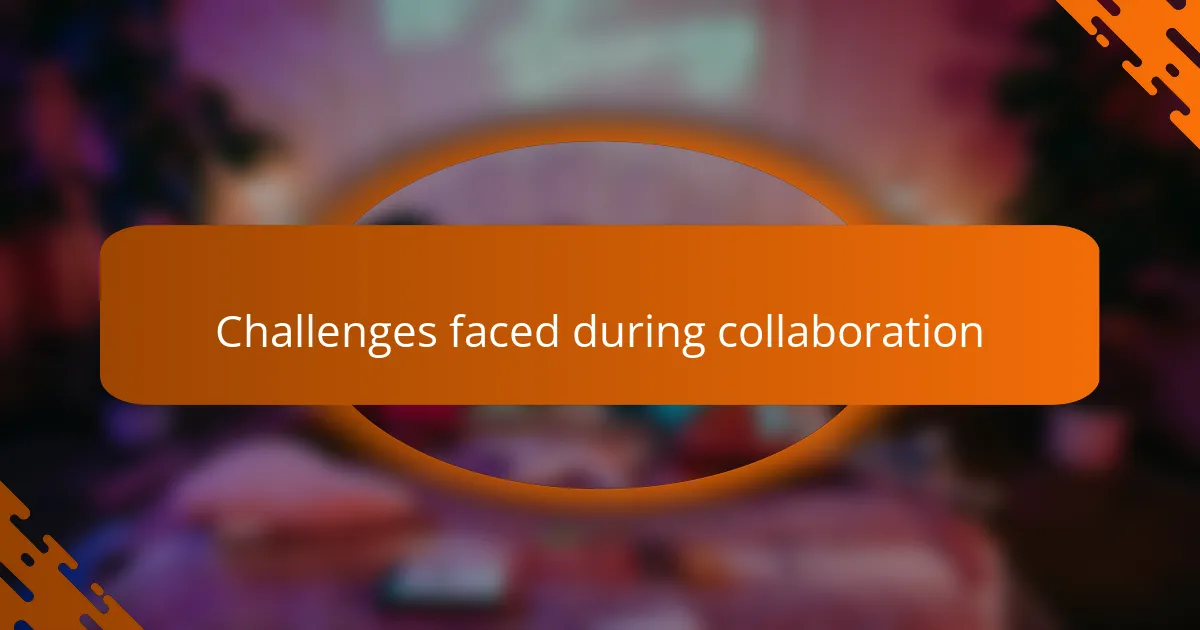
Challenges faced during collaboration
Collaboration in Nashville can be an exhilarating experience, but it’s not without its hurdles. One of the biggest challenges I faced was aligning schedules with fellow musicians. Between gigs and studio bookings, it sometimes felt like we were playing a game of musical chairs just to find time to create together. I remember one particular project where we nearly lost momentum because everyone was juggling multiple commitments—it was frustrating but also taught us the value of patience and flexibility.
Communication often emerged as another significant challenge. Misunderstandings or differing expectations can easily lead to creative differences. I recall a moment when I proposed an idea that I thought was brilliant, but my collaborators had a different vision. Rather than letting it derail our progress, we turned it into a productive discussion, ultimately leading to a richer sound. Here are some common challenges I encountered during collaborations:
- Coordinating schedules with busy musicians
- Misunderstandings about the project direction
- Balancing differing musical styles and preferences
- Finding common ground in creative discussions
- Staying motivated amidst delays or setbacks
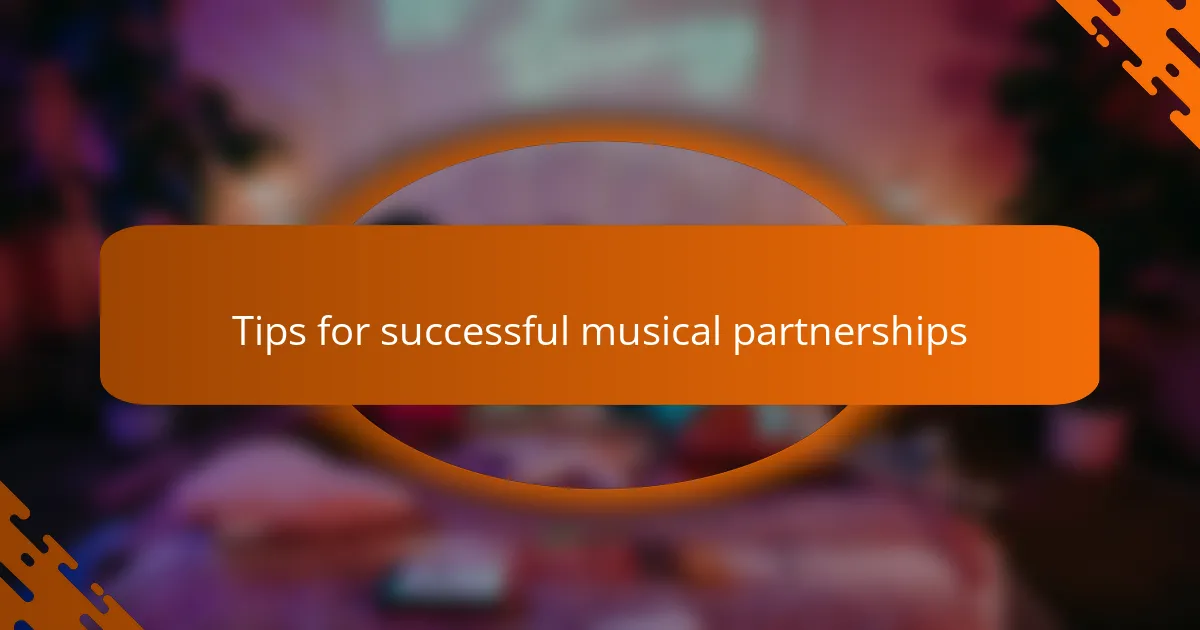
Tips for successful musical partnerships
When it comes to forming successful musical partnerships, I’ve learned that clear communication is key. In one of my collaborations, we faced a significant hurdle due to misaligned expectations. By sitting down and discussing our creative visions openly, we not only resolved the issue but also found a deeper synergy that enriched our work.
Creating a productive environment for collaboration also matters immensely. I remember a session where we took the time to establish a comfortable space—both physically and emotionally. That simple act fostered creativity and led to an unexpected hit. Here are some tips that have worked well for me:
- Set Clear Goals: Define what each party hopes to achieve from the collaboration.
- Communicate Regularly: Keep the lines of communication open to prevent misunderstandings.
- Respect Each Other’s Styles: Appreciate each artist’s unique sound and how it can complement yours.
- Stay Open to Feedback: Constructive criticism can elevate your work if approached positively.
- Cultivate Trust: Build a relationship where both parties feel safe to express ideas and concerns.
- Celebrate Wins Together: Acknowledge and celebrate your successes, no matter how small.
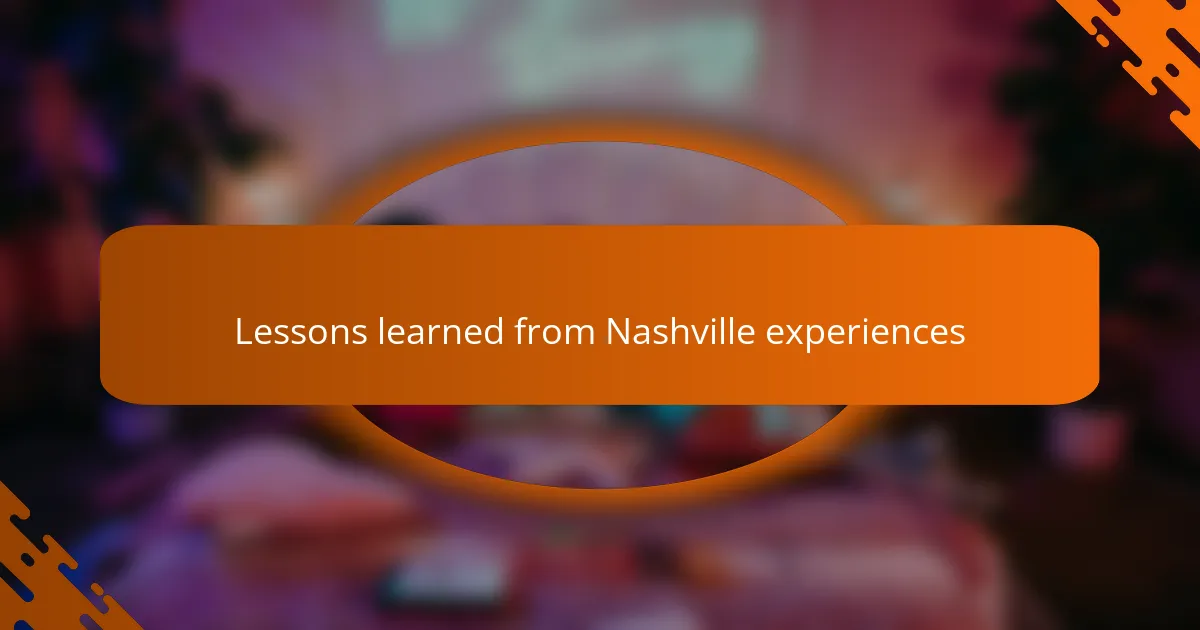
Lessons learned from Nashville experiences
It’s fascinating how Nashville’s collaborative spirit shaped my understanding of teamwork in music. One of the biggest lessons I learned is the power of vulnerability. By sharing personal stories in songwriting, I found that my emotions resonated deeply with others. Have you ever felt that connection when a song speaks to your own experiences? That’s what I aimed for, and it was a revelation to see how honesty could transform a simple melody.
Another key lesson revolved around the importance of flexibility. I vividly remember a project where we had to adapt our approach when someone suggested a wildly different direction. Instead of resisting, we embraced it, leading to a richer and more dynamic sound. It sparked a question in my mind: How often do we limit ourselves by clinging too tightly to our original vision? Nashville taught me that letting go can sometimes reveal the most beautiful creations.
Finally, I discovered the true value of building relationships within the music community. The connections I fostered often turned into unexpected collaborations. I was supporting a friend’s gig one night, and together, we jammed until dawn, igniting a creative spark that resulted in a fantastic new track. Isn’t it amazing how one night can change everything? That’s the kind of magic Nashville offers, teaching me that every collaboration is another opportunity for growth.